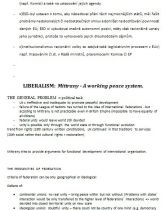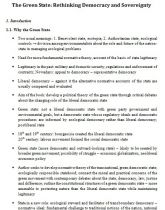Studijní materiál: Robyn Eckersley - The Green State: Rethinking Democracy and Sovereignty
Skrýt detaily | Oblíbený- Kvalita:92,3 %
- Typ:Studijní materiál
- Univerzita:Univerzita Karlova v Praze
- Fakulta:Fakulta sociálních věd
- Kategorie:Humanitní vědy
- Podkategorie:Politologie
- Předmět:Mezinárodní vztahy
- Autor:clean.bandit
- Ročník:3. ročník
- Rozsah A4:97 strán
- Zobrazeno:1 690 x
- Stažené:0 x
- Velikost:0,8 MB
- Formát a přípona:MS Office Word (.doc)
- Jazyk:český
- ID projektu:9376
- Poslední úprava:09.01.2017
1. Introduction
1.1. Why the Green State
• Two usual meanings: 1. Benevolent state, ecotopia; 2. Authoritarian state, ecological controls → division among environmentalists about the role and future of the nation-state in managing ecological problems
• Need for more fundamental normative theory, account of the basis of state legitimacy
• Legitimacy in the past: military and domestic security, regulations and enforcement of contracts; Nowadays: appeal to democracy - representative democracy
• Liberal democracy - against it the alternative normative accounts of the state are usually compared and evaluated
• Aim of the book: develop a political theory of the green state through critical debates about the changing role of the liberal democratic state
• Green state: not a liberal democratic state with green party government and environmental goals, but a democratic state whose regulatory ideals and democratic procedures are informed by ecological democracy rather than liberal democracy; postliberal state
• 18th and 19th century: bourgeoisie created the liberal democratic state
20th century: labour movement formed the social democratic state
1.1. Why the Green State
• Two usual meanings: 1. Benevolent state, ecotopia; 2. Authoritarian state, ecological controls → division among environmentalists about the role and future of the nation-state in managing ecological problems
• Need for more fundamental normative theory, account of the basis of state legitimacy
• Legitimacy in the past: military and domestic security, regulations and enforcement of contracts; Nowadays: appeal to democracy - representative democracy
• Liberal democracy - against it the alternative normative accounts of the state are usually compared and evaluated
• Aim of the book: develop a political theory of the green state through critical debates about the changing role of the liberal democratic state
• Green state: not a liberal democratic state with green party government and environmental goals, but a democratic state whose regulatory ideals and democratic procedures are informed by ecological democracy rather than liberal democracy; postliberal state
• 18th and 19th century: bourgeoisie created the liberal democratic state
20th century: labour movement formed the social democratic state



